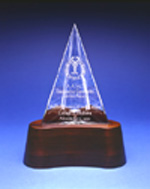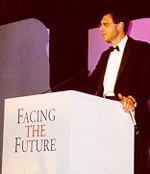National award recognizes community service success
by Lynne LangleyOf The Post and Courier Staff
Low-income elderly folks, afraid or unable to leave their homes, are getting medical care while unemployed women are learning how to land and keep jobs. Adult role models work with students in local schools, and three medical vans travel the tri-county offering screenings to find and prevent disease.
These and at least two dozen more programs help area residents, teach medical students and give doctors and nurses a new perspective on life outside the office.
The Medical University of South Carolina calls it community service.
Saturday night, the Association of American Medical Colleges presented MUSC an Outstanding Community Service Award, a highly competitive honor that brought association members to Charleston to watch and evaluate MUSC programs in action. “It's a tremendous tribute to hundreds of faculty and staff,” said MUSC President Dr. Ray Greenberg. “This is very much a group effort and partnerships,” he said, adding that the recognition should go to the whole community, not just MUSC.
 The
Outstanding Community Service Award was presented to MUSC by the Association
of American Medical Colleges.
The
Outstanding Community Service Award was presented to MUSC by the Association
of American Medical Colleges.
“I think we will be forever changed by this (community service) experience. Winning the award is the capstone on a program that is well received,” said Dr. Marilyn Laken, MUSC director of special initiatives. Medical students, staff and local residents benefit, said Laken and Greenberg.
Student volunteering began about nine years ago with MUSC Gives Back, which tallied 17,000 hours of volunteer work last year, said Laken. Among other things, students tutored middle school students, repaired homes of the indigent, sponsored blood drives and collected clothes for the homeless.
 MUSC
President Dr. Ray Greenberg addresses delegates to the Association of American
Medical Colleges in Washington, D.C. Greenberg accepted the organization's
Outstanding Community Service Award on behalf of the Medical University.
MUSC
President Dr. Ray Greenberg addresses delegates to the Association of American
Medical Colleges in Washington, D.C. Greenberg accepted the organization's
Outstanding Community Service Award on behalf of the Medical University.
As MUSC provost five years ago, Greenberg envisioned getting students and faculty to identify community needs, develop programs to address the needs and then keep the programs going, Laken said.
The state provided a one-time $11 million grant, three years of seed
money for the Healthy South Carolina
Initiative. Faculty competed for funds, and 28 programs went to work
in the community.
Of those, 20 have continued or expanded and have won more than $12 million from endowments and other new sources to sustain the programs. MUSC also has launched about a dozen more community projects with partners such as the public school system, churches and the Trident Urban League.
In three years of the initiative, more than 1,000 MUSC students reached more than 26,000 students in public schools and more than 130,000 individuals. Faculty and staff presented programs to more than 1,000 health-care professionals and gave more than 500 community presentations, said Laken, who is counting the totals for this year, the first since initiative funding ended.
“Our students are amazing. They are so enthusiastic,” she added.
Volunteerism, also known as student service learning, is a way for students to become better citizens, said Laken. “Public service is an ethic and value that is important to be incorporated along with medical training. “Some students say their lives are changed when they go into the community. They develop new insights of what it is like to walk in someone else's shoes.”
Students gain a better perspective of patients' lives and see a broader
range of problems than they would on
campus in specialized clinics, said Greenberg.
“Faculty develop more continuity with patients and are much more involved in prevention than in treating end-stage complications of illness,” he said, adding that faculty members comment that they find community service highly satisfying.
“We haven't had to twist people's arms to do this,” he said. “And we
hope to inculcate values in students that will be lifelong.”
Editor's note: The above is part of an article
that ran Nov. 5 in the Post and Courier and is printed with permission.

The O. Roscoe Mitchell/Enterprise Health Center
is just one of the many examples of MUSC going beyond the historical role
of academic medicine to reach out to communities whose needs are not being
met through the traditional health care delivery system. The health center,
to provide care to members of the Enterprise Community of Charleston and
North Charleston, was the result of six years of work and dedication by
members of the community, the cities of Charleston and North Charleston
and the Medical University. (For more information about the Enterprise
Health Center, see the Nov. 2, 2001 Catalyst.) Coincidentally the dedication
of the facility occurred a day before MUSC received the coveted Association
of American Medical Colleges Outstanding Community Service Award. Cutting
the ribbon at the Nov. 2 dedication ceremony from left are: J. Seth Whipper,
SC House of Representatives; Dudley Gregorie, senior community builder
for HUD; Sam Hart, North Charleston City Council; Rev. Ed McClain, Calvary
AME Church; David J. Mack III, SC House of Representatives; Rev. Alma Dungee,
Greater Charleston Empowerment Corporation; Davis Marshall representing
Congressman Jim Clyburn, City of Charleston Mayor Joe Riley; Gussie Green,
North Charleston City Council; MUSC President Ray Greenberg; and Dorothy
Mitchell (widow of O. Roscoe Mitchell).